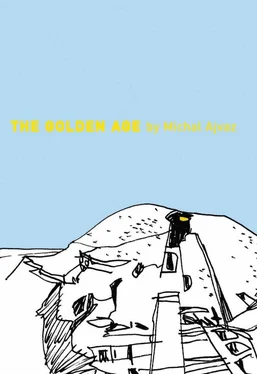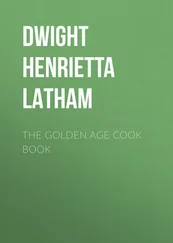Michal Ajvaz - The Golden Age
Здесь есть возможность читать онлайн «Michal Ajvaz - The Golden Age» весь текст электронной книги совершенно бесплатно (целиком полную версию без сокращений). В некоторых случаях можно слушать аудио, скачать через торрент в формате fb2 и присутствует краткое содержание. Год выпуска: 2010, Издательство: Dalkey Archive Press, Жанр: Современная проза, на английском языке. Описание произведения, (предисловие) а так же отзывы посетителей доступны на портале библиотеки ЛибКат.
- Название:The Golden Age
- Автор:
- Издательство:Dalkey Archive Press
- Жанр:
- Год:2010
- ISBN:нет данных
- Рейтинг книги:4 / 5. Голосов: 1
-
Избранное:Добавить в избранное
- Отзывы:
-
Ваша оценка:
- 80
- 1
- 2
- 3
- 4
- 5
The Golden Age: краткое содержание, описание и аннотация
Предлагаем к чтению аннотацию, описание, краткое содержание или предисловие (зависит от того, что написал сам автор книги «The Golden Age»). Если вы не нашли необходимую информацию о книге — напишите в комментариях, мы постараемся отыскать её.
is Michal Ajvaz’s greatest and most ambitious work.
The Golden Age
The Golden Age — читать онлайн бесплатно полную книгу (весь текст) целиком
Ниже представлен текст книги, разбитый по страницам. Система сохранения места последней прочитанной страницы, позволяет с удобством читать онлайн бесплатно книгу «The Golden Age», без необходимости каждый раз заново искать на чём Вы остановились. Поставьте закладку, и сможете в любой момент перейти на страницу, на которой закончили чтение.
Интервал:
Закладка:
And when I returned there were many things I no longer understood. All the complex syntaxes which determined roles within the family and within society as a whole seemed to me as distant and tedious, as bizarre and incomprehensible as the islanders’ grammatical categories and the rules of their games, and somewhat more stuffy and awkward. It was only after I returned to Europe that I found myself on the most distant and strangest of islands, an island from which there is no return because it is home. This was the Ithaca of the Odyssey , which someone had rewritten as a silent-screen comedy. (Screenplay: Odysseus, having for ten years consorted with monsters and demons, is himself more of a monster/demon than a man, and he discovers that he no longer understands much of the language of his homeland.) On the last of the islands all that home can provide is the role of the confused ethnologist, looking on as all around him perform mysterious rituals, some inducing depression, others imbued with a moving, nonsensical beauty.
But whoever thinks I am complaining, is wrong. I neither invented nor chose the protagonist who reaches out to the world through my mixed-up gestures, but I am happy with it and have no intention of exchanging it for any other; after all, it has grown out of my travels and encounters, out of the spaces outlined in my memory which perhaps only opened up at stations and in harbours in order to help in its making. I have heard the slow growth of this protagonist within the cocoon of landscapes; it is of no particular importance whether this long, patient childhood was the gradual genesis of the Self in the body of a stranger or some kind of macabre transformation within a monster. It is important to fuse with the rhythm of these changes, to be in thrall to the time when we are born on the islands and in the towns and countries we visit; it is not important to think about the legitimacy of a motion which makes sense only in and of itself, in the development of its rhythms, in the melody which leads up to no finale. This motion cannot accept vindication from anything outside itself: probably it is one of the very first beams of current to pass through the nothingness, which formed on their way the universe of stars, rocks, plants, bodies and consciousness.
Perhaps psychologists and psychiatrists would consider themselves competent to comment on my island in central Europe, but both would be wrong. The loosening and unravelling of the tissues of the world to reveal the womb beneath is a motion older than Man and, I believe, older than life itself. It is one of the motions that explains, among other things, psychology and psychiatry; for certain it is not the other way round.
Apart from all this, the silent-screen Ithaca is a great place to live; I am ever more aware of how much I like this last island, and I tell myself I would not wish to live anywhere else even if it were possible for me to leave it. It is true that nothing here makes any sense, but this is no great misfortune; I learned from the islanders that sense is not of any particular importance, that its presence may even disrupt the clean lines of certain pictures and cast a cloud over their fine light, while laments on the absurdity of being struck me as self-indulgent and objectionable even before my stay on the island. Once you get a little used to a terrain cleansed of sense, you realize that there is amusement enough to be had here, and that only in its emptiness can the magic crystals of beauty originate. And in this space something is revealed: the silent dignity of people, animals, plants and objects, that is able to stir graciousness, compassion and reverence.
Fungus and shell
But the evenings that turned into heavy dreams were rare, both for Karael and for me. The island feasts usually gave cause for delight; indeed, I would look forward to them far in advance and I still remember them fondly today. In the middle of the table there was often a pliant, white material which at first I took to be some kind of fungus. In fact it was the solidified secretion of a type of cuttlefish which was hunted in the warm, shallow waters above the coral reef which encircled the island’s shoreline.
Several times I was one of an expedition which went in quest of the cuttlefish’s white ink. The hunter floats in the clear waters above the bright-coloured coral garden, holding in his hand a kind of ratchet. As soon as he catches sight of the cuttlefish he begins to turn the wheel of the ratchet; the sound this makes frightens the cuttlefish and forces it to flee, but before it does so it releases a cloud of white fluid which twists and curls in the water, sending out projections and winding them back in, all the time solidifying quickly. This solidification starts in the middle and takes only a few seconds to reach the furthest points of white, which become slower in their movement, change gradually to a paste, then stiffen and go still, petrified in a gesture of flight or return.
The very first hunt I took part in presented me with an unforgettable experience. Having floated around the coral reef, Karael and I startled a school of cuttlefish, which disappeared in a flash, leaving white clouds in its wake like the souls of drowning men. As we swam about in the clouds we saw how they were transforming themselves. I fancied I saw in them human faces I knew well, but these would disappear immediately. When the transformations were over and the solidified cloudlets began slowly to sink, Karael and I caught them and threaded them — like soft metals — onto lines ending in a silver barb, which each of us had coiled around our waist.
This white ink fungus is treated in a number of different ways. Sometimes it is cut into slivers for use in a cuttlefish salad (I once saw in Paris how these slivers were laid on thin slices of a white baguette, lightly toasted on the grill and drenched in olive oil). Sometimes it is forced through a utensil which looks like a garlic press, out of which it emerges in the form of long, white spaghetti. Cuttlefish spaghetti are dressed in a red sauce from the pantry made of berries grown in the apartments of the lower town in the close, dark spaces between walls and the backs of rotting cupboards which have been there since the time of the European invasion; in addition to mines, the islanders also have gardens in their apartments. It was easy to carve the solidified ink of the cuttlefish into any shape one chose. The islanders would often ask me about the food where I came from, so once I used several cuttlefish mushrooms to fashion for them the fare on the table of a Czech pub, with plates of goulash and dumplings, a smaller plate with brawn, a basket of bread rolls, several half-litres of beer and glasses of rum, adding while I was at it, an open pack of cigarettes and an ashtray with cigarette ends in it. After the islanders had studied my creation, we ate it together.
Most commonly, however, cuttlefish fungus forms part of a dish known as the “pink porcupine.” For the preparation of this meal one also needs the shell of a certain marine snail. One night in the year this snail leaves the sea to shed its shell of twelve months and also to celebrate its lover’s ritual in a state of nakedness. Hundreds of snails come ashore, onto the sandy flats of the lower town, where they arrange themselves in the shape of a star with sixteen regular beams. Once the snails have assumed their places they wriggle out of their shells and their soft little bodies glow in the bluish light.
The ritual of their courtship is founded on a game of many-coloured lights and geometric figures. Watching this game from the upper town was an enchanting experience. First the beams of the great star down there on the flats bent themselves into S-shapes while the blue light of the odd beams turned green and then yellow and the blue of the even beams turned violet and then red. The next moment the individual, rippling beams began to change colour from yellow to red and vice versa; this they did in such a way that it looked from above as if the beams of the star were revolving rapidly around its centre. The rippling beams disintegrated before the fragments came together again to form eight fixed circles. Then a new game of lights set up, with the apparent motion coming from the centre and moving to the edge and back again.
Читать дальшеИнтервал:
Закладка:
Похожие книги на «The Golden Age»
Представляем Вашему вниманию похожие книги на «The Golden Age» списком для выбора. Мы отобрали схожую по названию и смыслу литературу в надежде предоставить читателям больше вариантов отыскать новые, интересные, ещё непрочитанные произведения.
Обсуждение, отзывы о книге «The Golden Age» и просто собственные мнения читателей. Оставьте ваши комментарии, напишите, что Вы думаете о произведении, его смысле или главных героях. Укажите что конкретно понравилось, а что нет, и почему Вы так считаете.












